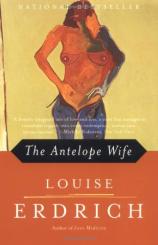Excerpt
Excerpt
The Antelope Wife

Chapter One
Father's Milk
Scranton Roy
Deep in the past during a spectacular cruel raid upon an isolated Ojibwa village mistaken for hostile during the scare over the starving Sioux, a dog bearing upon its back a frame-board tikinagun enclosing a child in moss, velvet, embroideries of beads, was frightened into the vast carcass of the world west of the Otter Tail River. A cavalry soldier, spurred to human response by the sight of the dog, the strapped-on child, vanishing into the distance, followed and did not return.
What happened to him lives on, though fading in the larger memory, and I relate it here in order that it not be lost.
Private Scranton Teodorus Roy was the youngest son of a Quaker father and a reclusive poet mother who established a small Pennsylvania community based on intelligent conversation. One day into his view a member of a traveling drama troupe appeared. Unmasked, the woman's stage glance broke across Roy's brow like fire. She was tall, stunningly slender, pale, and paler haired, resolute in her character, and simple in her amused scorn of Roy -- so young, bright-faced, obedient. To prove himself, he made a rendezvous promise and then took his way west following her glare. An icicle, it drove into his heart and melted there, leaving a trail of ice and blood. The way was long. She glided like a snake beneath his footsteps in fevered dreams. When he finally got to the place they had agreed upon, she was not there, of course. Angry and at odds, he went against the radiant ways of his father and enlisted in the U.S. Cavalry at Fort Sibley on the banks of the Mississippi in St. Paul, Minnesota.
There, he was trained to the rifle, learned to darn his socks using a wooden egg, ate many an ill-cooked bean, and polished his officers' harness leather until one day, in a state of uneasy resignation, he put on the dark blue uniform, fixed his bayonet, set off marching due west.
The village his company encountered was peaceful, then not.
In chaos of groaning horses, dogs screaming, rifle and pistol reports, and the smoke of errant cooking fires, Scranton Roy was most disturbed not by the death yells of old men and the few warriors shocked naked from their robes, but by the feral quiet of the children. And the sudden contempt he felt for them all. Unexpected, the frigid hate. The pleasure in raising, aiming. They ran fleet as their mothers, heading for a brush-thick gully and a slough of grass beyond. Two fell. Roy whirled, not knowing whom to shoot next. Eager, he bayoneted an old woman who set upon him with no other weapon but a stone picked from the ground.
She was built like the broken sacks of hay he'd used for practice, but her body closed fast around the instrument. He braced himself against her to pull free, set his boot between her legs to tug the blade from her stomach, and as he did so tried to avoid her eyes but did not manage. His gaze was drawn into hers and he sank with it into the dark unaccompanied moment before his birth. There was a word she uttered in her language. Daashkikaa. Daashkikaa. A groan of heat and blood. He saw his mother, yanked the bayonet out with a huge cry, and began to run.
That was when he saw the dog, a loping dirt-brown cur, circle the camp twice with the child on its back and set off into open space. As much to escape the evil confusion of this village and his own dark act as out of any sympathy for the baby, though he glimpsed its face -- mystified and calm -- Scranton Roy started running after the two. Within moments, the ruckus of death was behind him. The farther away the village got, the farther behind he wanted it. He kept on, running, walking, managing to keep the dog in view only because it was spring and the new grass, after a burn of lightning, was just beginning its thrust, which would take it to well over a full-grown man's height.
From time to time, as the day went on, the dog paused to rest, stretched patient beneath its burden. Grinning and panting, she allowed Roy to approach, just so far. A necklace of blue beads hung from the brow guard of the cradle board. It swayed, clattered lightly. The child's hands were bound in the wrappings. She could not reach for the beads but stared at them as though mesmerized. The sun grew razor-hot. Tiny blackflies settled at the corners of her eyes. Sipped moisture from along her lids until, toward late afternoon, the heat died. A cold wind boomed against Scranton Roy in a steady rush. Still, into the emptiness, the three infinitesimally pushed.
The world darkened. Afraid of losing the trail, Roy gave his utmost. As night fixed upon them, man and dog were close enough to hear each other breathing and so, in that rhythm, both slept. Next morning, the dog stayed near, grinning for scraps. Afraid to frighten him with a rifle shot, Roy hadn't brought down game although he'd seen plenty. He managed to snare a rabbit. Then, with his tinderbox and steel, he started a fire and began to roast it, at which smell the dog dragged itself belly-down through the dirt, edging close. The baby made its first sound, a murmuring whimper. Accepting tidbits and bones, the dog was alert, suspicious. Roy could not touch it until the next day when he'd thought to wash himself all over and approach naked to diminish his whiteman's scent...
Excerpted from The Antelope Wife © Copyright 2012 by Louise Erdrich. Reprinted with permission by Harper Perennial. All rights reserved.
The Antelope Wife
- paperback: 240 pages
- Publisher: Harper Perennial
- ISBN-10: 0060930071
- ISBN-13: 9780060930073








